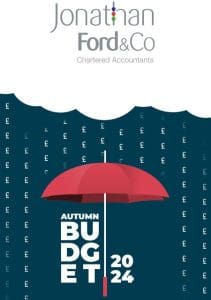Autumn Budget Guide 2024

Rachel Reeves delivered her first Budget as Chancellor of the Exchequer on 30 October 2024. It was a monumental budget which I think will be remembered for a long time. It was the first time the budget has been delivered by a woman. It was definitely a packed budget and it came thick and fast; it came with a punch to many employers and business owners. As always, the devil is in the detail and there is a lot to report on.
Below are a few highlights, however, you can read the full details in our budget guide here
A few highlights:
Personal tax
- Tax Thresholds- no changes were announced to the rates of Income Tax. In addition, the government will not extend the freeze to income tax thresholds. From April 2028, these personal tax thresholds will be uprated in line with inflation.
- The government will increase the Lower Earnings Limit and the Small Profits Threshold for National Insurance contributions (NICs) by 1.7% for 2025/26 to £6,500 and £6,845 per annum respectively. For those paying voluntarily, the government will also increase Class 2 and Class 3 NICs rates by 1.7% for 2025/26. The main Class 2 rate will be £3.50 per week and the Class 3 rate will be £17.75 per week.
- The government will not proceed with the reform to base the High Income Child Benefit Charge on household incomes as proposed by the previous government
Employment and employers NI
- From 6 April 2025 the rate of employers’ NICs will be increased by 1.2% to 15%. The per‑employee threshold at which employers start to pay NICs will be reduced from £9,100 per year to £5,000 per year.
- The Employment Allowance currently allows businesses with employer NICs bills of £100,000 or less in the previous tax year to deduct £5,000 from their employer NICs bill. The amount of the Employment Allowance will be increased from £5,000 to £10,500 and the £100,000 threshold for eligibility will be removed. You cannot claim employment allowance if your company has just one director and that director is the only employee liable for secondary Class 1 National Insurance.
The percentages for company car benefits will be increased for 2028/29 and 2029/30 as follows:
- Increase of 2% per year for zero emission and electric vehicles.
- Increase to 18% in 2028/29 and 19% in 2029/30 for cars with emissions of 1-50g of CO2 per kilometre.
- Increase of 1% per year for all other vehicle bands.
- The maximum will also increase to 38% in 2028/29 and 39% in 2029/30.
The government will uprate the Van Benefit Charge and Car and Van Fuel Benefit Charges by CPI from 6 April 2025.
From April 2025 the National Living Wage will increase to £12.21 per hour for all eligible employees and the National Minimum Wage for 18-20 year olds will increase to £10.00 per hour for all eligible workers.
Capital Taxes
- The lower rate of Capital Gains Tax (CGT) will be increased from 10% to 18% and the higher rate from 20% to 24% for disposals of non-residential assets made on or after 30 October 2024. The rates on residential property will be maintained at 18% and 24%.
- The rate of CGT on assets qualifying for Business Asset Disposal Relief and Investors’ Relief will rise gradually to 14% from 6 April 2025 and to 18% from 6 April 2026.
- The CGT rates currently applied to carried interest will be increased to 32% from April 2025 and carried interest will be taxed fully within the Income Tax framework from April 2026.
Inheritance tax
The Nil Rate Band and Residence Nil Rate Band for Inheritance Tax (IHT) are currently frozen at £325,000 and £175,000 respectively until April 2028. The government is extending these threshold freezes for a further two years to April 2030.
The government will bring unused pension funds and death benefits payable from a pension into a person’s estate for inheritance tax purposes from 6 April 2027.
Agricultural Property Relief (APR) and Business Property Relief (BPR) will be reformed. From April 2026, the first £1 million of combined eligible agricultural and business assets attract 100% relief. The rate of relief on excess assets will be 50%. The government will also reduce the rate of BPR to 50% for shares designated as ‘not listed’ on the markets of a recognised stock exchange, such as AIM.
From 6 April 2025 the government will introduce a new residence based system for IHT, ending the use of offshore trusts to shelter assets from IHT.
Other matters
Other announcements included:
- The higher rates of Stamp Duty Land Tax for purchases of additional dwellings will be increased from 3% to 5% from 31 October 2024.
- As previously announced, all education services and vocational training provided by a private school in the UK for a charge will be subject to VAT at the standard rate of 20% from 1 January 2025. This will also apply to boarding services provided by private schools. In addition, it is intended that private schools in England will no longer be eligible for charitable rate relief from business rates from April 2025.
- From 6 April 2025, the government will increase the late payment interest rate charged by HMRC on unpaid tax liabilities by 1.5%.





